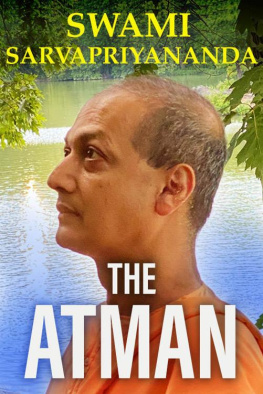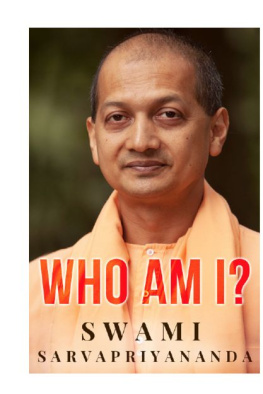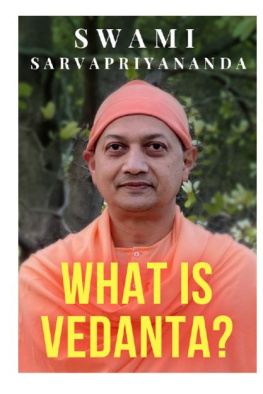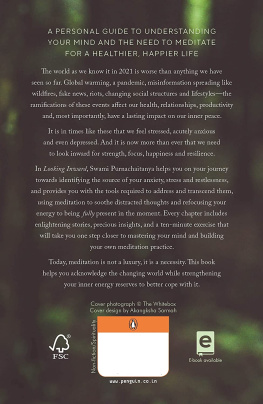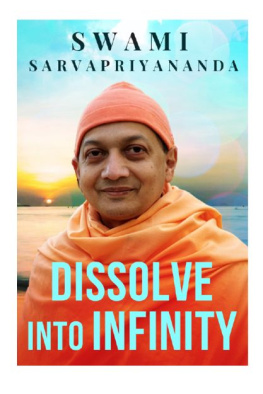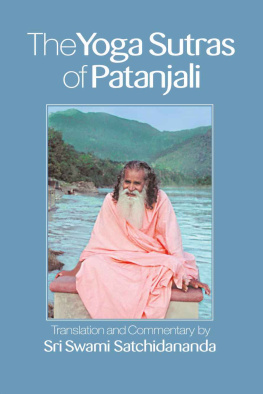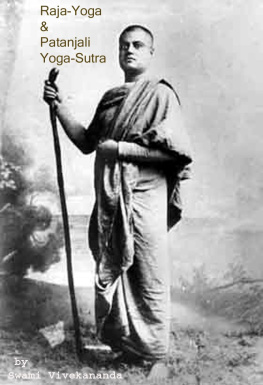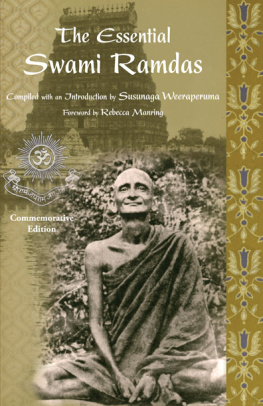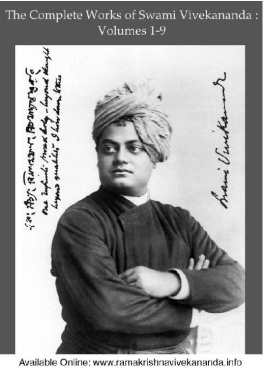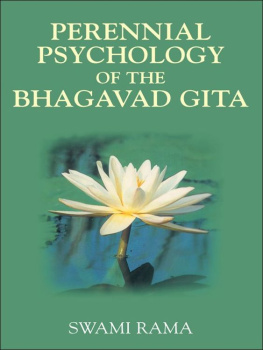Swami Sarvapriyananda - The Atman
Here you can read online Swami Sarvapriyananda - The Atman full text of the book (entire story) in english for free. Download pdf and epub, get meaning, cover and reviews about this ebook. year: 2021, genre: Religion. Description of the work, (preface) as well as reviews are available. Best literature library LitArk.com created for fans of good reading and offers a wide selection of genres:
Romance novel
Science fiction
Adventure
Detective
Science
History
Home and family
Prose
Art
Politics
Computer
Non-fiction
Religion
Business
Children
Humor
Choose a favorite category and find really read worthwhile books. Enjoy immersion in the world of imagination, feel the emotions of the characters or learn something new for yourself, make an fascinating discovery.
- Book:The Atman
- Author:
- Genre:
- Year:2021
- Rating:3 / 5
- Favourites:Add to favourites
- Your mark:
- 60
- 1
- 2
- 3
- 4
- 5
The Atman: summary, description and annotation
We offer to read an annotation, description, summary or preface (depends on what the author of the book "The Atman" wrote himself). If you haven't found the necessary information about the book — write in the comments, we will try to find it.
The Atman — read online for free the complete book (whole text) full work
Below is the text of the book, divided by pages. System saving the place of the last page read, allows you to conveniently read the book "The Atman" online for free, without having to search again every time where you left off. Put a bookmark, and you can go to the page where you finished reading at any time.
Font size:
Interval:
Bookmark:

The Atman
What is the central teaching of the Bhagavad Gita? The various commentaries on the Bhagavad Gita have different interpretations. Some say the central teaching of the Gita is Bhakti or devotion, while others say it is Karma or action, since Sri Krishna relentlessly urges Arjuna into action. Then there are those who consider Dharma or duty to be the central teaching of the Gita. Another way of looking at the Bhagavad Gita is as a manual of spiritual life with teachings on God, avatara , meditation and so on. All of these interpretations, no doubt, are true, but if you actually look at the Bhagavad Gita itself, when Sri Krishna starts teaching Arjuna, the first thing he teaches is probably the central message of Vedanta. The central message of Gita and the central message of Vedanta are one and the same, as Gita is a part of Vedanta. The central message of Vedanta is, without any doubt, the teaching on the Atman. One might think - who or what is Atman? And the answer is, its you! Atman is our real nature. It is what we really are.
In the second chapter of the Bhagavad Gita, after Arjunas lamentations, questions and doubts, Sri Krishna teaches Arjuna the doctrine of the Atman. The teaching is about what we really are and not what we think of ourselves to be. This is the central teaching of Vedanta - if we would really know ourselves as we truly are, if we know who am I or what am I, then all our problems would be solved. All the rest - teachings about God, about the creation of the Universe, about incarnation or avatara , about devotion and knowledge, about meditation and action - all of these come later. The very first teaching of the Gita, from the eleventh verse of the second chapter, where Sri Krishna starts speaking, to the twenty-fifth verse of the second chapter, the teachings are entirely about the Atman.
These verses focus on answering the question, Who Am I?, or more precisely, What Am I? The question Who Am I? can mean something quite different, especially in our world today. Who Am I? could mean, for example, inquiring if I am bound to be a musician or a stockbroker. But these are questions related to personality, the mind and our dispositions. But beyond these, there is an essential nature to ourselves, a spiritual nature, deeper than the person. Thats what the Atman is. The teaching of the Atman is the real nature, beyond the differing personalities which we exhibit.
The first thing Sri Krishna says, and repeats multiple times, is that - the Atman is beyond death. A simple but a very powerful statement. The essential teaching of any kind of spirituality in any religion, not just in Vedanta, is this conquest and transcendence of death. If death of the body is the end of us, then there is nothing more left. If there is nothing after death, religion itself becomes pointless. This transcendence of death is the first teaching about the Atman given by Sri Krishna.
When Swami Vivekananda visited the United States more than 100 years ago, one of the sublime mantras from the Upanishads that he loved quoting was about the immortality of the Atman.
Shrinvantu Vishvaye amritasye putraha, aaye dhamani divyani tastu. Vedaham purusham mahantam, adityavarnam tamasah parastat. Tameva viditva ati mrityumeti. Nanyah pantha vidyate ayanaya.
What does this beautiful verse mean? The very first line is striking! It means - Listen ye children of immortal bliss. We know we are fated to die. All those we have known such as grandparents and parents, may have died or will pass out of this world and so will we one day. Believers and non-believers, everybody dies. So death is the fundamental truth of life. We dont like dwelling upon it as it is an unpleasant truth, but its a truth nobody can deny. The author Ernest Becker won a Pulitzer Prize for his book The Denial of Death . He writes about the denial of death, and why and how we resist this idea that we are going to die. Its a rather morbid book but at the same time it is quite deep. It shows that most of the things we do in life are immortality projects, as phrased by the author. These include religion, children, grandchildren, founding companies and businesses, charities, writing books, and so on. All of these activities are basically the denial of death - doomed attempts to overcome inevitable death.
Even though we do not like to think about death directly, it haunts us. But we see in the first line of the mantra, amritasye putraha - Children of immortal bliss. It says that we are immortal. We are not mortal, though our bodies are mortal. And it says that this truth is not known to everybody, aaye dhamani divyani tastu. If there are gods in higher heavens, then, you too listen to this truth, which I am teaching you, because you do not know about it.
What is this truth? Vedaham purusham mahantam. I have realised that infinite being. There is a reality, an infinite reality. What is it like? Adityavarnam - Blazing forth with the light like the sun. Not a material light, and not even the light of the sun. It is the light of awareness or consciousness. Tamasaha parastat - Forever beyond darkness. Forever beyond the darkness of death, disease, and suffering.
A friend of mine, who is a monk and a mathematician, recommended a book to me - A Mathematicians Apology by G. H. Hardy (the Cambridge mathematician who had collaborated with Ramanujan). In this book, Hardy says quoting a poem, that one of the great motivations for doing mathematics is, that now on this level sand, between sea and land, what shall I build against the falling of the night. Here falling of the night means the approaching death. It is a very evocative sentiment. Whatever you are building is built in sand, and it will go away one day. We must find something that survives the falling of the night. Tamasaha parastat - beyond darkness, beyond death there is a reality. And what happens if you realise this reality? Tameva viditva ati mrityumeti, by realising that one transcends death. Is there any other way to transcend death? Can we use genetic engineering and medicine to live forever? Nanyah pantha vidyate ayanaya, there is no other way. Every other way, such as science and medical technology, solves our problems for a while, and even then they solve only one type of problem. But then other problems arise, or the same problems come back with doubled force.
Aham Brahmasmi - I am Brahman
If you read closely between the lines, a question arises. If there is indeed such a reality that is beyond death, and I realise it, then how is it that by experiencing it I go beyond death? To rephrase, suppose there is this extraordinary reality. Call it God or Brahman or anything else, and it is immortal, it is beyond suffering and death. But how does that help me? The claim is by realising That you go beyond death. This can only mean one thing. Realising That means, realising That is I. Aham Bramhasmi , I am Brahman. If that immortal reality is beyond death, then in some sense, I must be that. Otherwise how do I go beyond death by realising that reality? That immortal reality is my reality. Since it is my reality and its beyond death, then I am beyond death.
Years ago, I knew a very devoted elderly gentleman, Badal babu. This was many years ago at the ashram where I was a monastic novice. He has passed away now. In his youth, he used to visit a very great monk, Swami Premeshananda, who was a disciple of the Holy Mother Sarada Devi. Even in his lifetime, the Swami was acknowledged as an enlightened person. Now, Badal babu was a very devout and spiritually inclined young man. He would visit monks, yogis, and spiritual masters and would carry those stories back to Swami Premeshananda. He would relate wonderful inspiring stories about them and share their experiences with different forms of mediations, their realisations and spiritual visions. One day, while Badal babu was narrating one such story, Swami Premeshananda said with great feeling, My dear boy, if the whole world were to turn into spiritual giants like Sri Ramakrishna - but we remain the same, then ultimately what good is it to you or me? Ultimately, say at the point of death, you know of all these wonderful people who have attained such spiritual heights, but you yourself have not attained anything, then what good is it to you? Its great for them, but what about us? We must ourselves realise, I am Brahman. This is the first thing that Sri Krishna teaches Arjuna in the battlefield of Kurukshetra. He says, there is a reality which is your reality, and it is beyond death.
Font size:
Interval:
Bookmark:
Similar books «The Atman»
Look at similar books to The Atman. We have selected literature similar in name and meaning in the hope of providing readers with more options to find new, interesting, not yet read works.
Discussion, reviews of the book The Atman and just readers' own opinions. Leave your comments, write what you think about the work, its meaning or the main characters. Specify what exactly you liked and what you didn't like, and why you think so.

